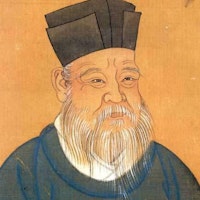The principle of Tao is just as close as what is right in front of our eyes, in our everyday lives, in eating and drinking, and in the maintaining of normal social relationships…
Zhu Xi

The Principle of Tao
Topic: Truth, Law, & Principle
The principle of Tao is just as close as what is right in front of our eyes, in our everyday lives, in eating and drinking, and in the maintaining of normal social relationships―between ruler and subject, and father and son, and between brothers, and spouses, and friends.
Zhu Xi, also known as Chu Hsi (romanized), was a Chinese philosopher, historian, scholar, calligrapher, poet, and politician during the Song dynasty, often considered the most significant Confucian thinker after Confucius himself. He was born in 1130 in Youxi, Fujian province, and passed away in 1200. Zhu Xi played a crucial role in the development of what is now known as Neo-Confucianism, a revival and reinterpretation of Confucian thought that sought to synthesize Confucian moral and ethical teachings with metaphysical insight, largely in response to the influence of Buddhism and Daoism. His philosophical outlook was encapsulated in the concept of "li" (principle or law) and "qi" (material force), which he saw as the fundamental elements of reality. He believed that the li were the underlying principles that governed the universe and everything in it, while qi represented the physical manifestation of these principles.
In "Further Reflection on Things at Hand," Zhu Xi emphasized the importance of proper conduct and constant self-cultivation. He urged his followers to diligently adhere to moral norms, practicing them day and night until they become internalized. The idea was to attain a state of moral behavior and thought that was so ingrained it didn't require conscious effort. This approach to moral cultivation reflected Zhu Xi's broader philosophical framework, which saw the understanding and realization of moral principles as the path to achieving harmony with the natural order of the universe.
Zhu Xi's philosophy has had a profound and lasting impact on Confucian thought and Chinese intellectual history. His interpretation of Confucianism became the state orthodoxy in China for several centuries. His works, such as "Commentaries on the Four Books," were used as standard texts for civil service examinations in China until the early 20th century. Today, Zhu Xi is recognized as one of the greatest scholars in Chinese history, and his teachings continue to inspire and inform Confucian thought.
Zhu, Xi. Further Reflections on Things at Hand: Chu Hsi, a Reader, P. 69 [Translated by Allen John. Wittenborn, University Press of America, 1991].

Zhu Xi
Theme: Eternal Truth

The Essence of Tao [73. Master Chu said:]
Resources
Related Quotes
Copyright © 2017 – 2025 LuminaryQuotes.com About Us